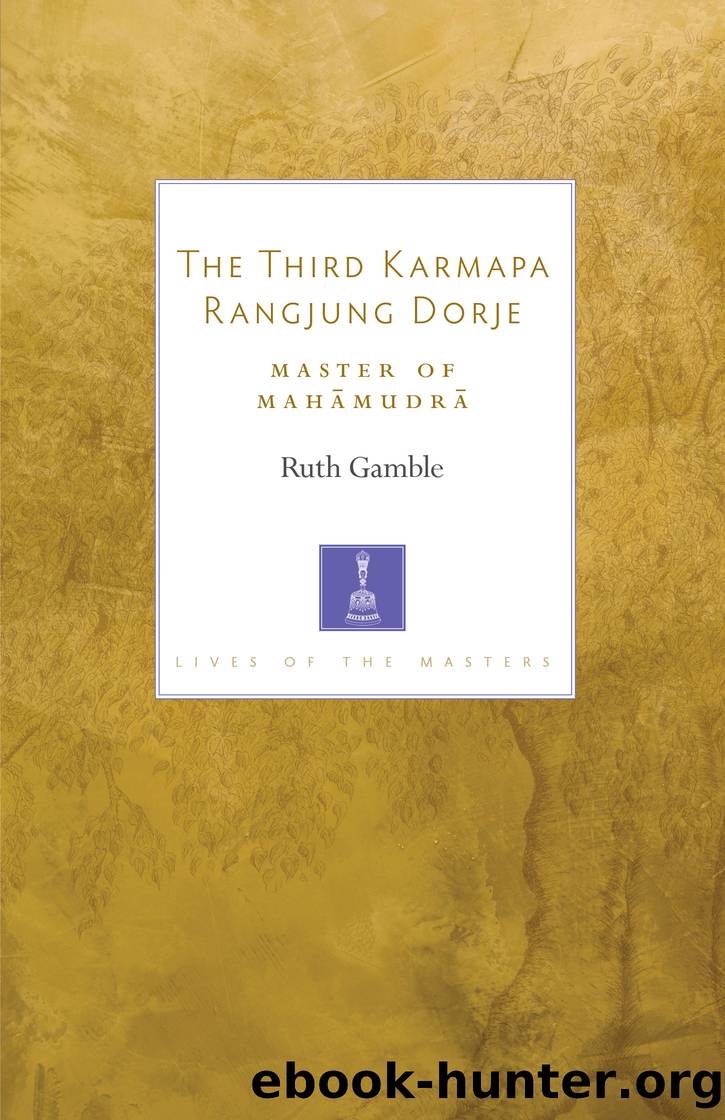The Third Karmapa Rangjung Dorje by Ruth Gamble

Author:Ruth Gamble [Gamble, Ruth]
Language: eng
Format: epub
Publisher: Shambhala
Published: 2020-11-10T00:00:00+00:00
Rangjung Dorje does not describe in any detail the process by which he procured the long-life water directly. He also skips over the other activities he performed while back in Tibet. Other sources, for example, suggest that he used some of the funds that he had accrued from the capitals to produce a gold-inked edition of the Buddhist canon.319 His only mention of this project in the Verse Liberation Story reads, âI had all the Buddhaâs sÅ«tras and the commentaries written out, and when I was consecrating them, countless bodhisattvas appeared to dissolve into them, and I heard a voice proclaiming the Dharma.â320
This edition of the canon may or may not be the version that later became known as the Tsel edition because it was written or housed at Tsel Monastery, the seat of the Tsel myriarch. If he is referring to the Tsel canon, then Rangjung Dorjeâs description of having finished it contradicts other sources that say it was finally completed by the young Tsel lord and author of the Red Annals, his student Tselpa Künga Dorje, sometime between 1347 and 1351, after Rangjung Dorjeâs death.321 Tselpa Künga Dorje does not mention Rangjung Dorjeâs contribution to this project in the Red Annals. The chronology and relationship between these two writers and their concurrent projects remain unclear and needs more investigation.
As Rangjung Dorje finished his version of the canon, Toghun Temür, or someone from his court, had already sent an envoy to bring him back to the capitals. Rangjung Dorjeâs protests against his return to the capitals were muffled in the Verse Liberation Story. But in his songs from this period and his later stay in the capitals, he is more strident. In these songs, he describes the capitals as the opposite of the sacred sites and hermitages of Tibet. Instead of praising them, he lists their faults and cites the many ways they impede yoga practice. In these descriptions, he produces poetic images of Dada and Xanadu that sit in direct contrast to those found more commonly in both the Chinese and Western poetic traditions. For Rangjung Dorje, Dadu and Xanadu were traps, not paradises. The song he wrote in Xanadu in 1337âwhich is quoted in the introduction and translated in full in chapter seventeen of this bookâreflects this assessment. It reads in part:
Now you are free from saá¹sÄraâs mud,
Strike out for nirvÄá¹aâs dry shore.
Now you have abandoned worldly relatives,
Rely on sacred, spiritual friends.
Now you have stopped pointless chatter,
Recite secret mantras.
Now you have stopped debauched exertions,
Exert yourself at dhyÄna.322
Now you have renounced sweets,
Rely on samÄdhiâs food.
Now that you have stopped hankering for towns,
Wander in mountainous borderlands.
Because when we donât do these thingsâ
External appearances become expert in deception;
Children of the mind, they are crazy in the head.
Preconceptions proliferate and last longer; but
Virtuous friends become increasingly rare.
Ignorant veils and fogs get thicker and
We wander on multiplying cliffs of depravity.
Unwholesome friends lead us
To prison, the three bad destinations,
Where we will wander without end.323
The song begins with a plea to his audience and himself not to give up their cultivation of yoga despite their surroundings.
Download
This site does not store any files on its server. We only index and link to content provided by other sites. Please contact the content providers to delete copyright contents if any and email us, we'll remove relevant links or contents immediately.
The Lost Art of Listening by Michael P. Nichols(7488)
Why I Am Not A Calvinist by Dr. Peter S. Ruckman(4148)
The Rosicrucians by Christopher McIntosh(3509)
Wicca: a guide for the solitary practitioner by Scott Cunningham(3166)
Signature in the Cell: DNA and the Evidence for Intelligent Design by Stephen C. Meyer(3125)
Real Sex by Lauren F. Winner(3013)
The Holy Spirit by Billy Graham(2943)
To Light a Sacred Flame by Silver RavenWolf(2813)
The End of Faith by Sam Harris(2733)
The Gnostic Gospels by Pagels Elaine(2527)
Waking Up by Sam Harris(2454)
Nine Parts of Desire by Geraldine Brooks(2357)
Jesus by Paul Johnson(2352)
Devil, The by Almond Philip C(2324)
The God delusion by Richard Dawkins(2305)
Heavens on Earth by Michael Shermer(2278)
Kundalini by Gopi Krishna(2180)
Chosen by God by R. C. Sproul(2160)
The Nature of Consciousness by Rupert Spira(2095)
